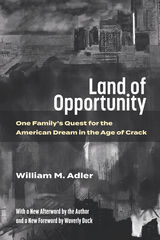3 books about Crack (Drug)

Fast Lives
Women Who Use Crack Cocaine
Claire E. Sterk
Temple University Press, 1999
Providing insight into drug use from the point of view of female users, this book tells of the complex lives, challenges, and choices of women who use crack cocaine. While popular images of these women present them simply as unreliable individuals, unfit mothers, and women who will do almost anything for crack, Claire Sterk's years of ethnographic research reveal the nature and meaning of crack cocaine use in the larger context of their lives -- including the impact of such issues as gender, class, and race.
Focusing on active crack users, Fast Lives compiles information from participant observation, informal conversations, individual interviews, and group discussions. Sterk details the ways in which use affects the lives of these crack users. She captures how these women arrived at their use; how they survive under current circumstances, such as the constant threat of HIV/AIDS and violence; how they combine the multiple social roles of mother and drug user; and how -- as they share their aspirations and expectations for the future -- their stories underscore the effects of poverty, sexism, and racism on their lives.
Many of these women recognize their own responsibility for ensuring positive change. Sterk's book, which includes an argument for a harm reduction approach, reminds us that their strength and courage will too often be futile without social policies that are realistic and appropriate for women.
Fast Lives will engage readers interested in social problems as well as students of cultural anthropology, sociology, criminology, public health, ethnography, substance abuse, and women's health.
Focusing on active crack users, Fast Lives compiles information from participant observation, informal conversations, individual interviews, and group discussions. Sterk details the ways in which use affects the lives of these crack users. She captures how these women arrived at their use; how they survive under current circumstances, such as the constant threat of HIV/AIDS and violence; how they combine the multiple social roles of mother and drug user; and how -- as they share their aspirations and expectations for the future -- their stories underscore the effects of poverty, sexism, and racism on their lives.
Many of these women recognize their own responsibility for ensuring positive change. Sterk's book, which includes an argument for a harm reduction approach, reminds us that their strength and courage will too often be futile without social policies that are realistic and appropriate for women.
Fast Lives will engage readers interested in social problems as well as students of cultural anthropology, sociology, criminology, public health, ethnography, substance abuse, and women's health.
[more]

Land of Opportunity
One Family's Quest for the American Dream in the Age of Crack
William M. Adler
University of Michigan Press, 2021
Part true crime, part work of urban sociology, Land of Opportunity is a meticulously researched account of the rise and fall of the Chambers brothers, who ran a multi-million-dollar crack cocaine operation in Detroit in the 1980s. Descended from Arkansas sharecroppers, BJ, Larry, and Willie Chambers moved to Detroit seeking economic opportunity, and built a successful drug empire by applying strict business principles to their trade; their business grossed an estimated $55 million annually until the brothers were sent to prison in 1989. Reading the Chambers brothers in the context of the fall of the Detroit auto-industry and its impact on the city’s economy and residents, Land of Opportunity demonstrates how for the Chambers brothers, crack dealing was a rational career choice; and through the Chambers brothers’ story, Adler provides bottom-up history of late Second Great Migration, deindustrialization, the War on Drugs, and crack era in both Detroit and the United States.
[more]

Misconceiving Mothers
Legislators, Prosecutors, and the Politics of Prenatal Drug Exposure
Laura Gomez
Temple University Press, 1997
A tiny African-American baby lies in a hospital incubator, tubes protruding from his nostrils, head, and limbs. "He couldn't take the hit," the caption warns. "If you're pregnant, don't take drugs." Ten years earlier, this billboard would have been largely unintelligible to many of us. But when it appeared in 1991, it immediately conjured up several powerful images: the helpless infant himself; his unseen environment, a newborn intensive care unit filled with babies crying inconsolably; and the mother who did this -- crack-addicted and unrepentant.
Misconceiving Mothers is a case study of how public policy about reproduction and crime is made. Laura E. Gomez uses secondary research and first-hand interviews with legislators and prosecutors to examine attitudes toward the criminalization and/or medicalization of drug use during pregnancy by the legislature and criminal justice systems in California. She traces how an initial tendency toward criminalization gave way to a trend toward seeing the problem of "crack babies" as an issue of social welfare and public health.
It is no surprise that in an atmosphere of mother-blaming, particularly targeted at poor women and women of color, "crack babies" so easily captured the American popular imagination in the late 1980s. What is surprising is the was prenatal drug exposure came to be institutionalized in the state apparatus. Gomez attributes this circumstance to four interrelated cause: the gendered nature of the social problem; the recasting of the problem as fundamentally "medical" rather than "criminal"; the dynamic nature of t he process of institutionalization; and the specific feature of the legal institutions -- that is, the legislature and prosecutors' offices -- the became prominent in the case.
At one level Misconceiving Mothers tells the story of a particular problem at a particular time and place -- how the California legislature and district attorneys grappled with pregnant women's drug use in the late 1980s and early 1990s. At another level, the book tells a more general story about the political nature of contemporary social problems. The story it tells is political not just because it deals with the character of political institutions but because the process itself and the nature of the claims-making concern the power to control the allocation of state resources.
A number of studies have looked at how the initial criminalization of social problems takes place. Misconceiving Mothers looks at the process by which a criminalized social problem is institutionalized through the attitudes and policies of elite decision-makers.
Misconceiving Mothers is a case study of how public policy about reproduction and crime is made. Laura E. Gomez uses secondary research and first-hand interviews with legislators and prosecutors to examine attitudes toward the criminalization and/or medicalization of drug use during pregnancy by the legislature and criminal justice systems in California. She traces how an initial tendency toward criminalization gave way to a trend toward seeing the problem of "crack babies" as an issue of social welfare and public health.
It is no surprise that in an atmosphere of mother-blaming, particularly targeted at poor women and women of color, "crack babies" so easily captured the American popular imagination in the late 1980s. What is surprising is the was prenatal drug exposure came to be institutionalized in the state apparatus. Gomez attributes this circumstance to four interrelated cause: the gendered nature of the social problem; the recasting of the problem as fundamentally "medical" rather than "criminal"; the dynamic nature of t he process of institutionalization; and the specific feature of the legal institutions -- that is, the legislature and prosecutors' offices -- the became prominent in the case.
At one level Misconceiving Mothers tells the story of a particular problem at a particular time and place -- how the California legislature and district attorneys grappled with pregnant women's drug use in the late 1980s and early 1990s. At another level, the book tells a more general story about the political nature of contemporary social problems. The story it tells is political not just because it deals with the character of political institutions but because the process itself and the nature of the claims-making concern the power to control the allocation of state resources.
A number of studies have looked at how the initial criminalization of social problems takes place. Misconceiving Mothers looks at the process by which a criminalized social problem is institutionalized through the attitudes and policies of elite decision-makers.
[more]
READERS
Browse our collection.
PUBLISHERS
See BiblioVault's publisher services.
STUDENT SERVICES
Files for college accessibility offices.
UChicago Accessibility Resources
home | accessibility | search | about | contact us
BiblioVault ® 2001 - 2024
The University of Chicago Press









